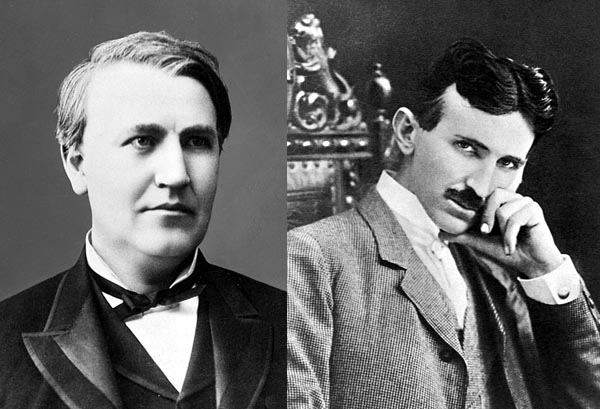 |
| Edison and Tesla: antagonists in the "War of the Currents" (Wikipedia: Edison, Tesla) |
Note: Thomas Edison was a titan of invention, but part of his success was due more to his business skill and temperament than to genius. Find out how he used this edge to beat out Nikola Tesla.
Get Ready: What makes someone a "genius"? is it just "being smart," or is it more?
Few American inventors have become as famous as Thomas Alva Edison, the "Wizard of Menlo Park." But his genius wasn't confined to the technical side of his work: he was also an acute businessman.
Case in point: the Serbian-American Nikola Tesla was (probably) as clever as Edison, but he didn't have the infrastructure or--more to the point--business acumen of Edison, and as a result was relegated to the fringes of the history of modern technology.
Some of Tesla's inventions contributed to our mass communications systems. He devoted a great deal of time to "fruitless" efforts to transmit sound and images over distances--the forerunners of today's mass and personal communications: land lines and cell phones, radio and television.
What's more, he is responsible for the widespread use of AC (alternating current) in electrical power systems, an unexpected outcome in what has been called the "War of the Currents" with his former boss--Edison!--who had promoted the alternative, DC (Direct Current).
(The explanation lies partially in the entry of a third party into the fray: George Westinghouse, who purchased Tesla's patent and built a system for delivering AC power.)
Tesla may have been even more brilliant than Edison--he had an eidetic (so-called "photographic") memory, which allowed him to recall almost anything he had seen. This allowed him to "build models in his mind," so to speak. Edison, on the other hand, was a relative plodder, who sketched things out on paper and needed to build working models to develop his ideas.
But Edison held nearly three times as many patents as Tesla. This may have been due to the contribution of Edison's many assistants, as well as his financial ability to purchase the ideas of less famous (and well-off) inventors and patent them in his name.
Edison was not particularly original. Many of his "advances" were being worked on by other scientists as well. He either got there first, or introduced more practical refinements to devices, making them more useful.
Nevertheless, Edison's method of employing staff and working on numerous projects at once ensured both technical and financial success.
Tesla died destitute and alone.
--------Read more: https://en.wikipedia.org/wiki/War_of_the_currents
Practice: Match the term to its definition below:
- acumen
- acute
- destitute
- fray
- fringes
- fruitless
- infrastructure
- patent
- plodder
- relegated
- facilities and systems designed to achieve a goal
- insight; shrewdness
- with no resources; poverty-stricken
- sent to a lower position
- useless; unproductive
- one who works slowly and methodically
- sharp (in insight)
- a right granted by a government to an inventor
- edges; margins
- a battle
Answers are in the first comment below.
Submitted to the Shenzhen Daily for June 28, 2021


Answers to the Practice: 1. b; 2. g; 3. c; 4. j; 5. i; 6. e; 7. a; 8. h; 9. f; 10. d
ReplyDelete